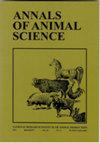Detoxification impacts of dietary probiotic and prebiotic supplements against aflatoxins: an updated knowledge
IF 2.2
4区 农林科学
Q2 AGRICULTURE, DAIRY & ANIMAL SCIENCE
引用次数: 0
Abstract
Abstract The widespread prevalence of food pollutants seriously threatens human and animal health. Mycotoxins are secondary metabolites primarily formed by toxigenic fungal genera, including Aspergillus, Penicillium, Fusarium, and Alternaria, demonstrating one of the principal pollutants in diets or feed products. Mycotoxin contamination in food can harm health, including stunted development, immune system suppression, infertility, vomiting, and gastrointestinal and cancerous conditions. These effects can occur both acutely and chronically. The complex food chain can be contaminated with mycotoxins at any point, including during harvest, industrial processing, shipping, or storage, putting the food sector under societal pressure owing to the waste generated by infected goods. One of the biological controls of mycotoxin is provided by probiotics and prebiotics, controlled as foods and dietary supplements made of bacteria or yeast. Aflatoxin's bioavailability and gastrointestinal absorption can be reduced using various probiotics and prebiotics.膳食益生菌和益生元补充剂对黄曲霉毒素的解毒作用:最新知识
食品污染物的广泛存在严重威胁着人类和动物的健康。真菌毒素是次生代谢物,主要由产毒真菌属形成,包括曲霉、青霉、镰刀菌和交替菌,是饲料或饲料产品中的主要污染物之一。食品中的霉菌毒素污染会损害健康,包括发育迟缓、免疫系统抑制、不育、呕吐、胃肠道疾病和癌症。这些影响可急性发生,也可慢性发生。复杂的食物链在收获、工业加工、运输或储存等任何环节都可能被霉菌毒素污染,受感染货物产生的废物使食品部门面临社会压力。真菌毒素的一种生物控制是由益生菌和益生元提供的,作为由细菌或酵母制成的食物和膳食补充剂加以控制。使用各种益生菌和益生元可以降低黄曲霉毒素的生物利用度和胃肠道吸收。
本文章由计算机程序翻译,如有差异,请以英文原文为准。
求助全文
约1分钟内获得全文
求助全文
来源期刊

Annals of Animal Science
农林科学-奶制品与动物科学
CiteScore
4.00
自引率
5.30%
发文量
138
审稿时长
6-12 weeks
期刊介绍:
Annals of Animal Science accepts original papers and reviews from the different topics of animal science: genetic and farm animal breeding, the biology, physiology and reproduction of animals, animal nutrition and feedstuffs, environment, hygiene and animal production technology, quality of animal origin products, economics and the organization of animal production.
 求助内容:
求助内容: 应助结果提醒方式:
应助结果提醒方式:


